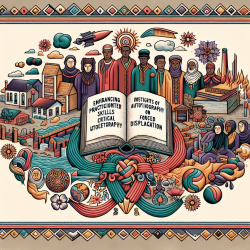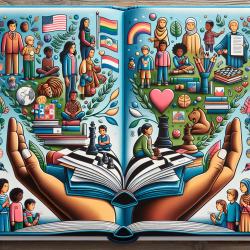In today's multicultural societies, practitioners in education and social services are increasingly encountering diverse populations with complex backgrounds. A recent study titled "Racialization, Colonialism, and Imperialism: A Critical Autoethnography on the Intersection of Forced Displacement and Race in a Settler Colonial Context" offers valuable insights into these complexities. This research provides a counter-narrative to common assumptions about migrants, particularly those forcibly displaced from the Global South.
The Importance of Critical Autoethnography
Critical autoethnography is a qualitative research method that combines personal narrative with cultural analysis. It allows researchers to share personal experiences to better understand cultural phenomena. In this study, the author uses their lived experiences as a descendant of forcibly displaced Chinese-Vietnamese people to critique assumptions about migrants in Canada.
Key Themes Explored in the Research
- Racialization: The study examines how racialization processes affect migrants' experiences, highlighting stereotypes such as the "grateful refugee" and "model minority" myths.
- Colonialism and Imperialism: The research critiques colonial and imperial policies that have historically oppressed marginalized communities, emphasizing the need for resistance and liberation.
- Intersectionality: By focusing on forced displacement and race, the study sheds light on how these intersecting factors shape migrants' lives in settler colonial contexts.
Implications for Practitioners
Practitioners working with diverse populations can benefit from understanding the outcomes of this research. Here are some ways they can enhance their skills:
1. Embrace Cultural Competence
Cultural competence involves recognizing and respecting cultural differences while actively seeking to understand diverse perspectives. Practitioners should engage in continuous learning about the histories and experiences of marginalized communities to provide more effective support.
2. Challenge Stereotypes
The study highlights how stereotypes like the "grateful refugee" can impact service delivery. Practitioners should challenge these narratives by acknowledging the resilience and agency of migrants while addressing systemic barriers they face.
3. Advocate for Anti-Racist Policies
Understanding the historical context of colonialism and imperialism can inform advocacy efforts for anti-racist policies. Practitioners should work towards creating inclusive environments that dismantle oppressive structures.
4. Foster Inclusive Dialogue
Creating spaces for open dialogue allows individuals to share their stories and experiences. Practitioners can facilitate discussions that promote understanding and empathy among diverse groups.
The Role of Further Research
This study underscores the importance of ongoing research into the intersection of forced displacement and race. Practitioners are encouraged to engage with current literature and contribute to research efforts that advance knowledge in this field.
Conclusion
The insights gained from this critical autoethnography offer valuable guidance for practitioners seeking to improve their skills when working with diverse populations. By embracing cultural competence, challenging stereotypes, advocating for anti-racist policies, fostering inclusive dialogue, and engaging in further research, practitioners can better support marginalized communities in navigating complex social landscapes.










